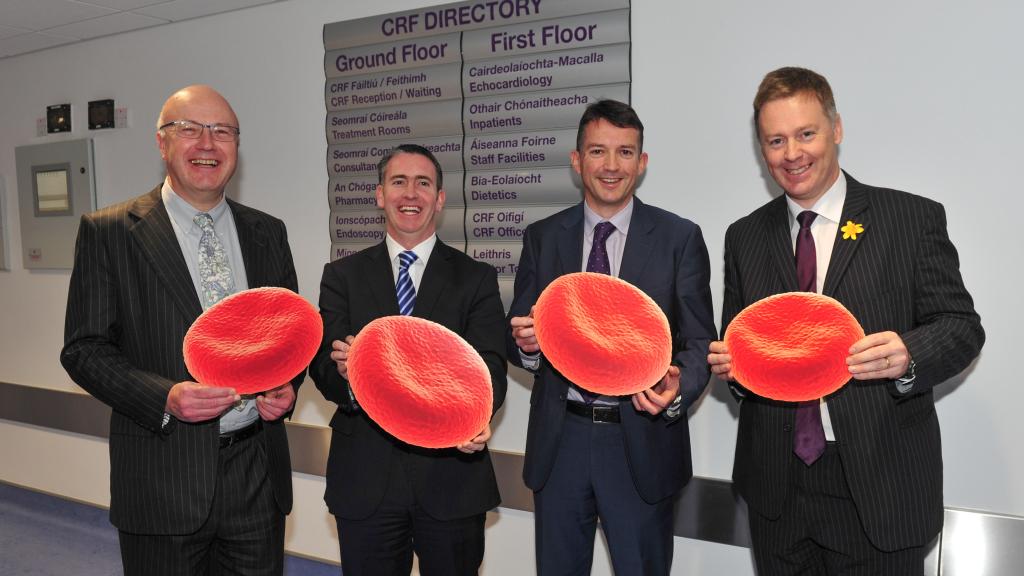
Fresh hope for Irish blood cancer patients with €2.2m research investment launched by Minister English
- Irish Cancer Society and Science Foundation Ireland invest €2.2 million in a new clinical research network for blood cancers
- Irish patients to be among the first in the world to test new, potentially life-saving treatments
A new national clinical research network was launched today by Minister for Skills, Research & Innovation which will bring fresh hope for blood cancer patients in Ireland. The newly established Blood Cancer Network Ireland represents a multimillion euro investment in cancer research by the Irish Cancer Society and Science Foundation Ireland. The €2.2 million investment has established a new virtual clinical research network that will offer early stage haematology clinical trials, providing blood cancer patients in Ireland with the opportunity to be among the first in the world to test new, potentially life-changing, drugs and treatments. This joint investment with Science Foundation Ireland comes on foot of the Irish Cancer Society’s strategy to establish and support collaborative cancer research initiatives to bring Irish clinicians, scientists and population researchers together to increase the pace of discoveries. This new national cancer research initiative is also supported by the pharmaceutical industry. Commenting on this significant investment in cancer research, Minister for Skills, Research, and Innovation, Mr Damien English TD said, “The establishment of Blood Cancer Network Ireland by Science Foundation Ireland and the Irish Cancer Society will bring real and tangible benefits to Irish cancer patients by helping to develop new treatments for blood cancer. It is in line with the Government’s policy of investing and focusing excellent scientific research that impacts positively on Ireland’s economy and society.” Over the next five years, Blood Cancer Network Ireland (BCNI) hopes to make novel drugs and treatments available to patients with all types of blood cancers across Ireland. The first clinical trials being rolled out through BCNI will bring fresh hope, in particular, to patients with difficult to treat blood cancers. Patients with Multiple Myeloma (MM) or Acute Myeloid Leukaemia (AML) will be among the first to take part in early phase clinical trials to test the safety and effectiveness of experimental and potentially life-saving drugs that are in development. Early stage clinical trials test the safety, efficacy, dosage, and side effects of new drugs and treatments on a small number of patients, usually at an advanced stage of disease. These trials are the first hurdle in the licensing process in the development of experimental drugs and treatments. BCNI will be established across the country through clinical research facilities in NUI Galway, University College Cork, and St James’s Hospital/ Trinity College Dublin and the Irish Clinical Oncology Research Group (ICORG) will also be a partner in this national network. The research initiative will be led by Professor Michael O’Dwyer, Professor of Haematology at NUI Galway, and will also involve Professor Mary Cahill, Clinical Professor of Haematology, University College Cork; Professor Paul Browne, Professor of Haematology, Trinity College Dublin; Dr Eva Szegezdi, NUI Galway, and Dr Harry Comber, National Cancer Registry of Ireland, as co-lead investigators. This new clinical research network will establish a blood cancer biobank to collect and analyse patient samples to further our knowledge and understanding of blood cancers and an enhanced registry, in association with the National Cancer Registry of Ireland, to collect information about the treatment, outcomes, and quality of life of patients with blood cancers in Ireland. Director of Blood Cancer Network Ireland, Professor of Haematology at NUI Galway, Michael O’Dwyer, said, “This investment will put Ireland on the map in terms of developmental therapeutics in blood cancers. We are now in a position to attract cutting edge Phase I/II trials to Ireland giving Irish patients the earliest access to promising new treatments, while the development of a dedicated biobank and registry will greatly enhance our efforts in the areas of translational, population and health economics research. Overall, this investment will have many potential benefits: it will make Ireland internationally competitive in blood cancer research, increase access to expensive medicines free of charge with consequent savings to the taxpayer, enhance research and development in Ireland, contribute to job creation, and most importantly of all, benefit patients.” Head of Research at the Irish Cancer Society, Dr Robert O’Connor, said, “We are delighted to partner with Science Foundation Ireland to fund this innovative cancer research initiative that will bring new hope for blood cancer patients across the country. The Society is investing in research that is making a real difference to patient lives and this investment is another example of the vital and impactful cancer research that is being facilitated thanks to the support of members of the public who donate and fundraise for us. Blood Cancer Network Ireland is the second collaborative cancer research initiative to be rolled out by the Society and ultimately it will give blood cancer patients new treatment options and hope for the future.” Professor Mark Ferguson, Director General Science Foundation Ireland and Chief Scientific Adviser to the Government of Ireland, said, “A key goal of Science Foundation Ireland’s strategy Agenda 2020 is to develop significant strategic partnerships with industry, charities and international funders to support excellent and impactful research in Ireland. We are pleased to partner with the Irish Cancer Society and industry to support the establishment of Blood Cancer Network Ireland. This new clinical research network will bring direct benefits to cancer patients, support new drug discovery through clinical trials and increase our research competitiveness.” For further information about this new national research initiative visit www.bloodcancers.ie.
